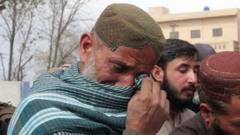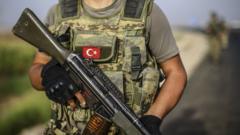The harrowing account of passengers during the hijacking reveals the severity of insurgences in the region, underscoring the need for increased safety measures.
**Pakistan Train Hijacking: A Shocking Onboard Siege Beckons Attention**

**Pakistan Train Hijacking: A Shocking Onboard Siege Beckons Attention**
An armed attack on the Jaffar Express in central Pakistan leaves questions on security and insurgency in Balochistan.
The Jaffar Express train was ambushed in the remote Bolan Pass of Balochistan province as over 400 passengers traveled from Quetta to Peshawar. The attack unfolded with a bomb detonation that derailed the train and prompted armed militants from the Balochistan Liberation Army (BLA) to storm the carriages. Eyewitness Mehboob Hussain reported sounds of gunfire immediately after the explosion.
The militants took the opportunity to separate hostages based on ethnicity, threatening to execute passengers if their demands for the release of political prisoners were not met within 48 hours. The BLA claimed the siege, which lasted over 30 hours, was a demonstration of their ongoing fight against what they see as systemic oppression by the Pakistani government.
During the siege, rescuers managed to free around 300 hostages according to reports, but 140 individuals remain unaccounted for. Many aboard described the experience as a “doomsday scene” of violence and chaos, with conflicting reports on casualty numbers including the deaths of militants, civilians, and security personnel.
Amid the siege, a railway police officer onboard engaged in a fierce firefight with the insurgents until ammunition ran scarce. Tragically, civilians like Noor Muhammad experienced heart-stopping moments as they witnessed fellow passengers, including a man's cousin, being murdered in front of them. Survivors, including Noor and his wife, eventually managed to escape amidst the confusion caused by the arrival of security forces.
As tensions continue to simmer in Balochistan, the attack illustrates the precarious security landscape for both civilians and law enforcement. The Pakistani military continues efforts to resolve the hostage situation while those who made it out alive express gratitude for their escape, revealing the urgent need for enhanced measures to prevent further violence in the region.
The militants took the opportunity to separate hostages based on ethnicity, threatening to execute passengers if their demands for the release of political prisoners were not met within 48 hours. The BLA claimed the siege, which lasted over 30 hours, was a demonstration of their ongoing fight against what they see as systemic oppression by the Pakistani government.
During the siege, rescuers managed to free around 300 hostages according to reports, but 140 individuals remain unaccounted for. Many aboard described the experience as a “doomsday scene” of violence and chaos, with conflicting reports on casualty numbers including the deaths of militants, civilians, and security personnel.
Amid the siege, a railway police officer onboard engaged in a fierce firefight with the insurgents until ammunition ran scarce. Tragically, civilians like Noor Muhammad experienced heart-stopping moments as they witnessed fellow passengers, including a man's cousin, being murdered in front of them. Survivors, including Noor and his wife, eventually managed to escape amidst the confusion caused by the arrival of security forces.
As tensions continue to simmer in Balochistan, the attack illustrates the precarious security landscape for both civilians and law enforcement. The Pakistani military continues efforts to resolve the hostage situation while those who made it out alive express gratitude for their escape, revealing the urgent need for enhanced measures to prevent further violence in the region.






















